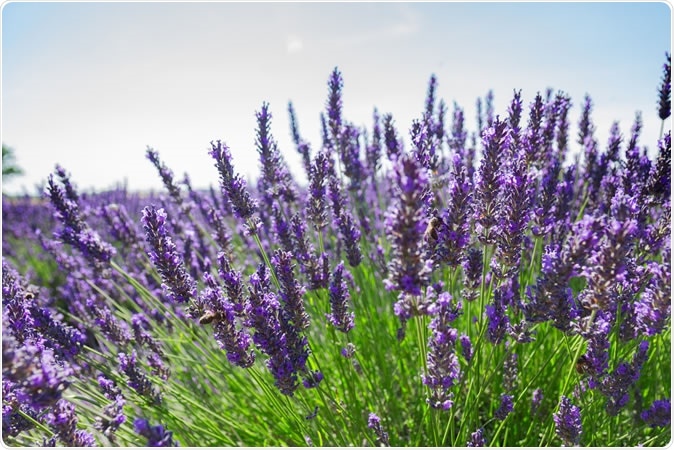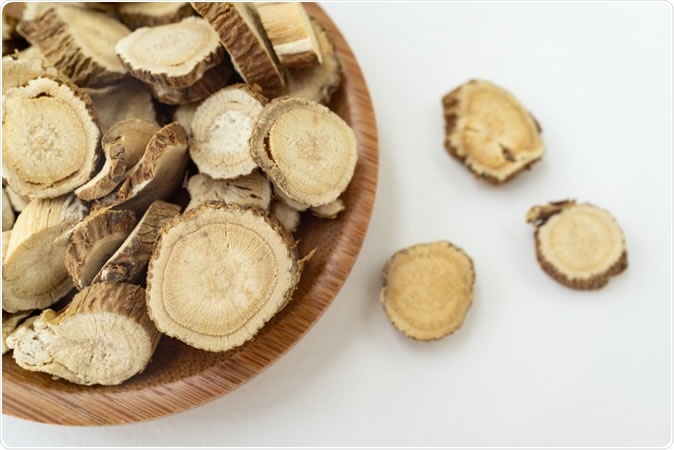A study from the University of California, Irvine, explains a hitherto unknown mechanism of action for bioactive molecules in commonly used plant-based folk medicines like fennel, camomile and lavender that are used to lower the blood pressure.

Lavender (Lavandula angustifolia), a plant widely used in herbal teas, essential oils, soaps and lotions, was discovered to be among the most efficacious KCNQ5 potassium channel activators. Image Credit: Neirfy / Shutterstock
The research, which was published on September 30, 2019, in Proceedings of the National Academy of Sciences (PNAS), explains how these botanicals act on a particular type of potassium ion channels called KCNQ5, which are expressed on smooth muscle cells within the walls of blood vessels. These herbs affect vascular tone by relaxing the smooth muscle fibers in arterial walls, reducing the blood pressure.
The scientists also noted that this action was not present in modern anti-hypertensive medication, and has not been recognized by most current screening techniques used to build chemical libraries. The KCNQ5 channel is known chiefly as a regulator of neuronal excitability, and its role in modulating arterial blood pressure has largely gone unnoticed. However, multiple plant extracts that have a hypotensive effect on the blood vessels operate via this specific mechanism.
Herbal medicines have been used as long as there have been plants and people on the earth. In fact, archaeologists have found evidence from Neanderthal DNA that early humans used medicinal plants, definitely not for food. Even nonhuman species are thought to have eaten plants for purposes other than food.
Even today, consumers in all societies use folk medicines derived from plants, and there is widespread evidence as to their effectiveness in many disorders, though some of the so-called evidence is from personal experience rather than from rigorous trials. However, clinical experiments also support conclusions in favor of the efficacy of many botanical preparations. The vital piece of missing evidence is the underlying mechanisms of molecular action, and in the case of the current study, this piece seems to have fallen into place.
The potassium channel activated by the plant extracts in the present study is called KCNQ5, and along with other similar molecules like KCNQ1 and KCNQ4, it is found in the wall of blood vessels, in the smooth muscle cell membranes. Its activation leads to a relaxation of the smooth muscle fiber, which causes an increase in the caliber of the blood vessel, resulting in a drop in blood pressure.
The importance of this mechanism is that it is shared by multiple botanical extracts used in folk medicine all over the world, in a host of different cultures. This includes Lavandula angustifolia, or lavender, which is among the most powerful KCNQ5 activators. Other comparable molecules include fennel seed extract and camomile, according to researcher Geoff Abbott. On the other hand, plant extracts that did not produce a lowering of blood pressure lacked the capability to activate the KCNQ5 channel.
In the root of one plant, Sophora flavescens, the researchers also found an alkaloid called aloperine, which is a powerful activator of this molecule. A specific isoform of this molecule binds near the foot of the voltage-sensitive part of the channel molecule to bring about a change in conformation which activates the channel. Similar molecules in other plants demonstrated to have similar mechanisms of action are waiting to be discovered. This could spur the development of new anti-hypertensive medications.

Sophora flavescens. Image Credit: 95R17 / Shutterstock
The researchers say, “Our discovery of these botanical KCNQ5-selective potassium channel openers may enable development of future targeted therapies for diseases including hypertension and KCNQ5 loss-of-function encephalopathy.”
Journal reference:
KCNQ5 activation is a unifying molecular mechanism shared by genetically and culturally diverse botanical hypotensive folk medicines. Rían W. Manville, Jennifer van der Horst, Kaitlyn E. Redford, Benjamin B. Katz, Thomas A. Jepps, and Geoffrey W. Abbott. PNAS. September 30, 2019. https://doi.org/10.1073/pnas.1907511116. https://www.pnas.org/content/early/2019/09/26/1907511116